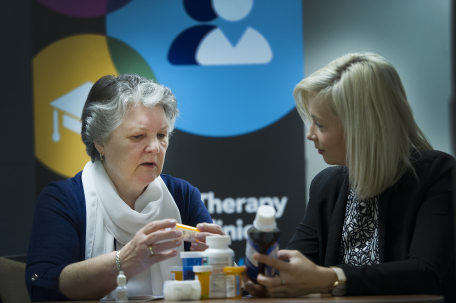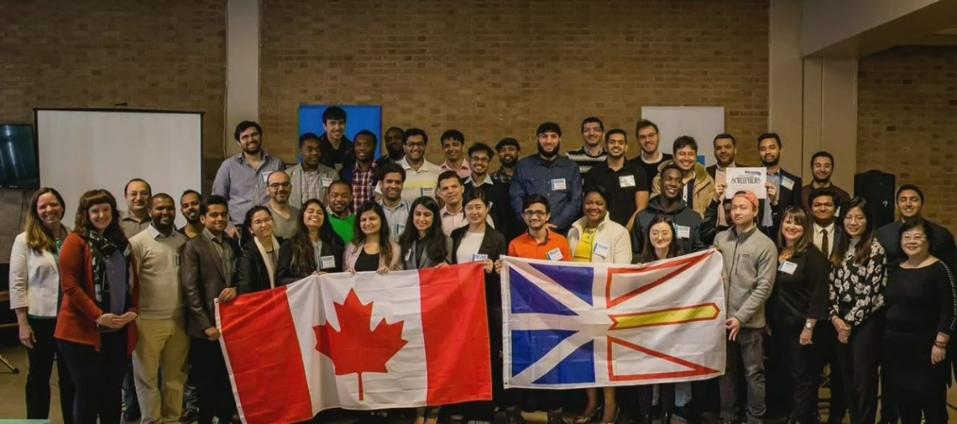Yaffle Connects
Yaffle Connects provides a causal and friendly café-style format for researchers, community groups, and individuals to present ideas, projects and research of interest – essentially the ‘live’ version of Yaffle, Memorial University’s online connecting tool. The focus of this format is to build connections, broker collaborations, and share ideas.
Since its inception in Spring 2019, there have been five Yaffle Connects events. Brief descriptions and links to both the recorded sessions and detailed PDF reports summarizing the presentations can be found below.
2019 |
2020 |
2020
"Aðskilin við fæðingu" [Separated at Birth]: Reflections on Agriculture in Iceland and NL
4 February 2020

While Iceland has a smaller population than NL (and a similar geography and climate), they produce almost 40% more food domestically. What can we learn from them about self-provisioning? Dr. Ivan Emke, Honorary Research Professor and Facilitator, Kitchen Table Communications, joined us for a Yaffle Connects session which explored some intriguing insights about the food and culture of these two places.
SYNOPSIS:
In his presentation, Dr. Emke considers the various similarities between Iceland and NL (geography, climate, history, traditional culture, etc.), and contrasts these places with how different they are in their agricultural outcomes.
For example, Iceland considers agriculture to be a profitable sector, as well as part of their culture of self-provisioning. NL, on the other hand, has far less reliance on internal production, and imports most food eaten in the province. Furthermore, NL farmers lack the representation that Icelandic farmers enjoy; in Iceland there is a much higher demand for local goods, lending them more bargaining power in the food market.
Dr. Emke concludes by pointing to the differences between Iceland and NL, remarking on how Iceland’s independence as a country allows them policy freedoms that NL, as a province, does not have. He does, however, suggest that NL starts looking to Iceland for inspiration on how to progress in the agricultural sector moving forward.

2019
Buying-In: How Values-Based Procurement Can Help Build Healthy Local Economies
28 October 2019
Large institutions have big purchasing power. What if these institutions used that purchasing power to further their social and economic impact on the region they serve? Eastern Health recently embarked on a “value-based procurement strategy” that seeks innovative ways for enhancing outcomes for both patients and local businesses. Ron Johnson (Vice President, Information Services & Rural Health) and Deanne Piercey (Associate Director, Strategic Procurement, Financial and Administrative Services, Memorial University of Newfoundland) joined us on October 28th, 2019, to examine the potential opportunities, benefits and practicalities of value-based procurement approaches.
Watch the full presentation here.
SYNOPSIS:
Mr. Johnson takes a look at the changes that Eastern Health’s procurement system has undergone, going from a system that bought as many resources for as little cost as possible to one that procures resources based on their value. This new system involves open discussion with vendors and encourages long-term partnerships between companies. NL has already partnered with several international companies under this system to get better healthcare in the province, and, as well as helping medically, these partnerships have created local jobs and hold the promise to create even more.
Ms. Piercey explains more closely the previous and current procurement systems. Before the change to value-based procurement, obtaining resources was a long and complicated process with many obstacles to improvement. Now, however, the ability to have conversations with vendors means it is much easier to get the product or service with the highest value. This system, like the partnerships, also benefits NL’s economy by letting healthcare providers prioritize smaller, local vendors.
Study & Stay: Making NL Home for International Students
26 September 2019
The Atlantic Canada Study and Stay initiative is a new program aimed at building partnerships helping students create a future in NL where they can make their mark on the innovative and entrepreneurial landscape. Program Coordinator Ying Zhang gave us a closer look at the challenges and opportunities facing international students who wish to make NL their home after graduation.
Watch the full presentation here.
SYNOPSIS:
Ms. Zhang presents Study and Stay, a program that teaches international students the skills they need to start their business. The free competitive online program runs from October to July and focuses on preparing students to enter the entrepreneurship space in NL, either through starting their own business or getting a job until they can sustain themselves. This program fits with a new immigration pathway the NL government has put in place for international graduate entrepreneurs, and helps them down that path. Students get mentorship from members of the community as well as the chance to network with a wide range of people. The program aims to set students up for success in NL, and offers funding to 5 students who have graduated to help them start their business. It also values interaction between the students and the community, since that opens more doors for all parties involved.
Women on the Water:
Challenges and Opportunities for Women in the Maritime Sector
25 June 2019

For this Yaffle Connects session, we were joined by four women--Kimberley Orren, Jasmine Paul, Nicole Power, and Crystal Hanlon-- involved in NL’s fishery. They provided us with a closer look at the challenges and opportunities facing women in the maritime sector. As a major industry in our province traditionally dominated by men, what are the challenges still facing women in the industry? How can we overcome them? What else needs to be done to better recognize, increase, and improve the opportunities?
Watch the full presentation here.
SYNOPSIS:
Kimberly Orren, Fishing for Success, heads a panel of women involved with the NL fishery as they present their experiences and their understandings of the challenges that women face in the industry. Jasmine Paul, Apprentice Fisher, draws attention to the negative comments and stereotypes she has seen on social media. Crystal Hanlon, Marine Engineer and Instructor at the Marine Insitutute, goes through her career in the industry and some of the difficulties she has overcome. Dr. Nicole Power, Professor of Sociology at Memorial, summarizes two major themes in feminist fisheries research: the importance of recognizing the supportive work, typically done by women, that also makes up the fisheries, and the necessity of understanding how seemingly gender-neutral policies advantage men and disadvantage women.
Ms. Orren goes over the role that women currently play in more male-dominated fields, and offers solutions such as the increased presence of role models and targeted programming to increase female representation. She asks the panel a few questions about the barriers they’ve faced, as well as the relationships they’ve formed in the industry. To end, the panel answers questions from the audience, largely focusing on the importance of welcoming women into the fisheries and supporting more sustainable fishing practices.
Too Many Pills: Deprescribing for Health
16 May 2019

Medications are meant to improve our health, but over time some medications may cause more harm than good. Learn how pharmacists at the School of Pharmacy’s Medical Therapy Services Centre are reducing pill consumption and improving clients' health and well-being.
Watch the full presentation here.
SYNOPSIS:
Dr. Cathy Balsom, a clinical pharmacist at Memorial University, presents her experience with deprescribing medications; that is, taking away an unnecessary medication, reducing its dose, or switching to another, less harmful drug. She operates at the Medication Therapy Services clinic, where she and other pharmacists talk to patients and see if their prescriptions are optimized for them. This is in line with the Canadian Deprescribing Network, a program aiming to reduce potentially risky prescriptions and raise awareness of alternative therapies. Seniors are often taking more drugs than necessary, due to a cascade of side effects, which may be prevented by changing even a few medications. Dr. Balsom headed a study at St. Patrick’s Mercy Home where she found that residents could be deprescribed an average of 2.5 drugs per person, and assessed that, overall, more education and communication are needed to deal with the issue of overprescribing.
Read the full report summary here.
Check out our News page for information on future events!
For questions about Yaffle Connects (the sessions), contact Mandy R. [mandy.rowsell@mun.ca]. For questions about Yaffle (the website), contact Mandy S. [mandys@mun.ca].
